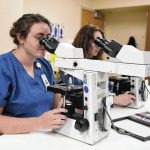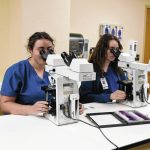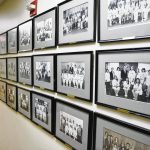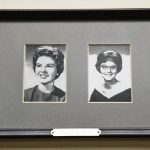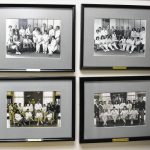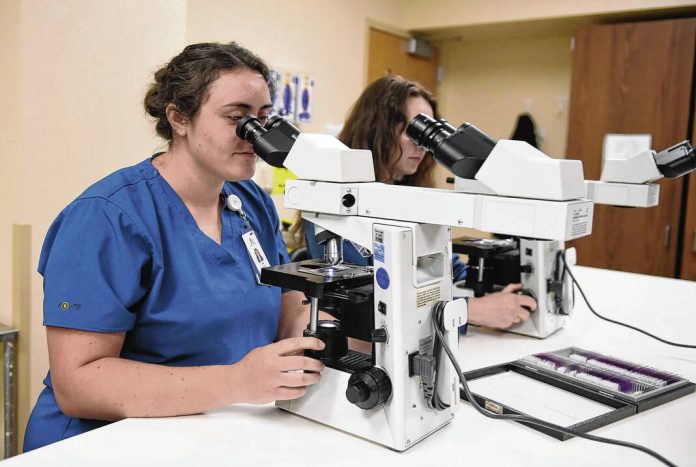
From left, Sarah Gaither and Emma Wade look at samples under a microscope at the Clinical Laboratory Science Program lab inside Franciscan Health Indianapolis on April 12. The program, which has been ongoing at Franciscan Health since 1965, is ending in May.
RYAN TRARES | DAILY JOURNAL
For months at a time, the small lab inside Franciscan Health Indianapolis was filled with students pouring over microscopes, slides and other equipment.
They were learning how to analyze blood and other bodily substances, looking for evidence of disease, searching for important health indicators and using their skills to best diagnose a patient. Already, they had spent hours in the classroom to studying chemistry, hematology, immunology and much more.
The work could be brutal at times, but was all the more satisfying when they mastered it.
“When people think of lab results, they think the test goes to a magic place, spins around and spits back out,” said Sarah Gaither, a part of Franciscan’s Clinical Laboratory Science Program. “But it is an actual science. You don’t just put things in a computer and look at a screen all day. You have to know the process and how the body works.”
Generations of students had come through Franciscan Health’s lab training program, leaving with the critical skills needed to be a vital part of the health care system.
“Every day, there are lab scientists all over the world diagnosing something or finding an answer for a patient, and it’s because of their background that they’re able to pick up on and say, ‘Wait a minute, this is critical, I need to tell the doctor right away,” said DeAnne Maxwell, director of the Clinical Laboratory Science Program.
The era comes to a close this May when the last class of the Clinical Laboratory Science Program graduates. More than 400 people have gone through the course. They have left it to do everything from joining the Franciscan Health staff to becoming clinical instructors to emerging as leaders in industry, research and academia throughout the United States.
Seeing the program end is tough, said Emma Wade, a member of the program and an Edinburgh resident. But she is proud to have been part of it.
“It’s really sad. We’ve only been here for one year, so we haven’t seen what DeAnne has. We didn’t know all the other classes and see how it’s grown and changed. But even for us, when we found out the program was closing, we were all very sad about it,” she said. “It’s hard to see something that really changed your life fall apart.”
From left, Sarah Gaither and Emma Wade look at samples under a microscope at the Clinical Laboratory Science Program lab inside Franciscan Health Indianapolis on April 12. The program, which has been ongoing at Franciscan Health since 1965, is ending in May.
RYAN TRARES | DAILY JOURNAL
From left, Sarah Gaither and Emma Wade look at samples under a microscope at the Clinical Laboratory Science Program lab inside Franciscan Health Indianapolis on April 12. The program, which has been ongoing at Franciscan Health since 1965, is ending in May.
RYAN TRARES | DAILY JOURNAL
Edinburgh resident Emma Wade looks at samples under a microscope at the Clinical Laboratory Science Program lab inside Franciscan Health Indianapolis on April 12. The program, which has been ongoing at Franciscan Health since 1965, is ending in May.
RYAN TRARES | DAILY JOURNAL
Framed photographs of the yearly classes of the Clinical Laboratory Science Program hang inside Franciscan Health Indianapolis on April 12. The program, which has been ongoing at Franciscan Health since 1965, is ending in May.
RYAN TRARES | DAILY JOURNAL
A framed photograph of graduates of the second class of the Clinical Laboratory Science Program hangs inside Franciscan Health Indianapolis on April 12. The program, which has been ongoing at Franciscan Health since 1965, is ending in May.
RYAN TRARES | DAILY JOURNAL
Framed photographs of the yearly classes of the Clinical Laboratory Science Program hang inside Franciscan Health Indianapolis on April 12. The program, which has been ongoing at Franciscan Health since 1965, is ending in May.
RYAN TRARES | DAILY JOURNAL
The lab training program came to life in 1965. Dr. Robert Costin, a pathologist at what was known as St. Francis Hospital in Beech Grove, was concerned with the way testing was performed.
At the time, doctors were not only completing their rounds with patients but performing tests and making clinical diagnoses. They needed help to focus their energy on treating people.
So Costin approached leadership of the hospital, asking to create a program training student-scientists in lab work. The School of Medical Technology started with a single student, Donna Phillips.
Quickly, however, the program grew in size and evolved. Each year, students accepted into the training would be immersed in a 10-month, full-time program. Most of the students are still in college, using the program to gain real-life experience while earning 32 credit hours to be applied toward their degree.
They then interact with instructors and specialists to learn such skills as clinical microscopy, clinical practicum, hematology, lab skills and microbiology.
Maxwell was one of those students. She completed the program in the early 1980s and eventually was tapped to head it in 1993.
“In each of the classes we teach, we do a lot of anatomy and physiology. So the basis they get is what’s normal, and then we talk about all of the different ways things go bad,” she said. “They differentiate if this test is high and this is low, what does that mean? So when they’re out doing testing, their brain should automatically be able to gather a picture of what’s going on with a patient.”
In the classroom, students learn about what lab results mean for patients and how those results indicate different diseases. A student lab allows them to practice administering the tests, while another main laboratory is set up for them to work on running the tests themselves.
“We get the best of both worlds. In here, we gain all of the knowledge, and then in the lab, we get the experience,” Wade said.
Emma Wade, who already earned her bachelor’s degree in biology from the University of Indianapolis before starting, joined the Clinical Laboratory Science Program to help guide her career. As the Edinburgh resident approached graduation, she had no idea what she wanted to do, she said.
“What I really liked about this program, and lab programs in general, is you get a lot of training and experience while you’re in school,” she said. “In college, I didn’t feel comfortable enough to go somewhere and have skills, because I didn’t really have any.”
One of Wade’s professors suggested the Franciscan Health program. She applied, and was accepted.
Gaither was attending Purdue University when she learned about lab programs. She applied to five different lab programs, including Franciscan Health’s, and though each offered solid approaches and promised to develop her skills, what drew her to Franciscan Health was the atmosphere that had been cultivated.
“What I really came away with was, the instructors and students and people in the lab cared about each other. They were part of a family,” the Bedford native said. “It showed they could not only offer what I wanted in a career, but in the time I was here, they’d care and pour into me.”
The connection between students and instructors has been an integral part of the program. Students from decades ago still contact Maxwell and each other, part of an exclusive group of graduates who have gone on to change lives in the health care system.
“People have told me that my legacy is the fact that all of my students are thriving, somewhere out there in the world,” Maxwell said. “They’re doing such amazing things, and I’m so proud of them. I love that they let me know what they’re doing, and keeping me up in their lives.”
On May 12, Wade and Gaither will join five other students to graduate as the final class of the Clinical Laboratory Science Program. Hospital demands and the need for space drove that decision, Maxwell said.
Being part of the final class of the program has been difficult, as the program has endured what feels like daily changes and unexpected challenges.
But there has been value in that experience, Wade said.
“We have a running joke — there’s a white board out there where we keep a tally of what we call ‘Mental Breakdown Days,’ days we get really bad news,” she said. “But health care is always changing, so you have to be adaptable. This year, having gone the way it has, has forced us to be adaptable. So it’s been a good experience in that sense.”
Maxwell is extremely proud of the work they’ve done.
“When every day changed, and every day was a new plan, they just roll with the punches. They’re going to be amazing lab scientists in health care today. Amazing class,” Maxwell said.
AT A GLANCE
Clinical Laboratory Science Program
What: A specialized program offered to students, training them to do lab work and testing.
Where: Franciscan Health Indianapolis
When: Founded in 1965 and ending in May
How many: More than 400 people have graduated from the program
This year’s graduates: Sarah Gaither (medical lab science) Purdue University; Mattie Gragert (medical technology) Ball State University; Abby Nuro (medical lab science) Miami University; Andrew Pennycuff (medical technology) Ball State University; Marlena Seward (medical lab science) Purdue University; Kate Vorhis (medical lab science) Purdue University, and Emma Wade (biology) University of Indianapolis


